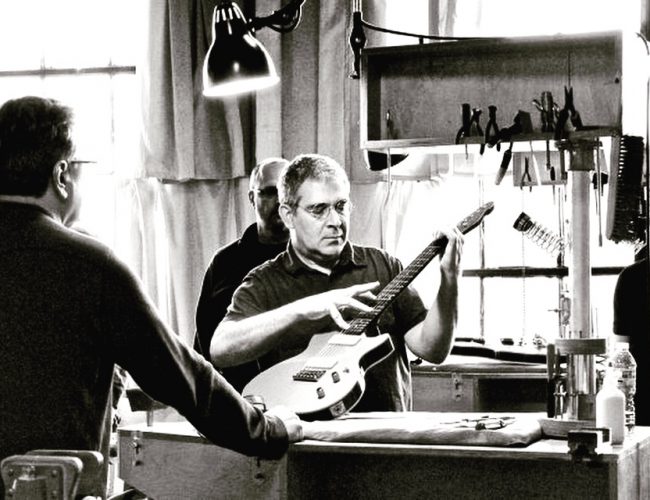Guitars, like other wooden instruments, are very sensitive and while you might think your guitar will live, and sound great forever, it won’t unless you properly care for it. Guitar care and maintenance isn’t something to be taken lightly: a guitar that has been loved and cared for can be seen and heard a mile off. There are some things that every guitar owner can do to ensure their guitar lives a long and happy life, so make sure you’ve got the following four important areas of guitar care and maintenance covered.
1. Temperature and Humidity
As guitars are made from wood, they can easily be affected by natural elements such as temperature and humidity. If there is too much moisture, this can cause the guitar to expand and swell, which can affect the geometry of the guitar, ultimately affecting the tone and playability. If it is too dry this causes the wood to shrink and crack, which can also affect the tone and playability. If it is too hot, this can weaken the glue, and if it’s too cold this can chill the lacquer finish causing it to crack.
The optimum temperature for storing guitars is between 18-24˚c, and humidity should be between 45-55%. The closer you can get to these factors the better as this is ideal for the wood and will not affect the playability, finish or integrity of the guitar in any way. Avoid putting/storing your guitar anywhere where these elements are stressed. Never leave it somewhere hot, like next to a radiator, in an airing cupboard, or in direct sunlight on a hot day. Also never leave it somewhere too cold, like outside on a cold winter’s night.
2. Cleaning after Use
After using a guitar we leave dirt, grease, oils and sweat all over it, and although these might not seem dangerous, over time they can slowly break down the finish. This can cause the finish to become discolored, and if your sweat has high acid content this can cause the finish to deteriorate. This happens because our sweat contains water, acids and salt (among other minerals) which are corrosive. For this reason, it is advised that you clean your guitar regularly, and if possible after every use. You need to be careful what you clean it with as some products could wear away the finish. Some may recommend using a polish, but if you have a small crack in the lacquer (even a hairline crack) this can sweep through, and discolor the wood beneath.
In my experience, the best thing for cleaning the main lacquer body of the guitar is meths (methylated spirits). Methylated spirits at its simplest is ethanol (alcohol) mixed with methanol, and has a whole host of users, from camp stoves, cleaning windows, and in this case cleaning guitars. Meths are perfect for degreasing and cleaning guitars, as they leave no residue on the surface, and the smell disperses quickly. Although the main ingredient is alcohol, do not drink this as it is poisonous. You only need to use a very small amount on a small piece of cotton or rag and wipe clean once you have finished (use very sparingly, you don’t need a lot). Beware, meths can dissolve oils, so if your fret board isn’t varnished this can remove the oil and dry it out. If your fret board isn’t varnished use a lemon oil to clean and rejuvenate the wood. When it comes to string care, all you need is a micro-fiber cloth to rub the string down. This will remove anything on the string which could reduce the life span, dull the sound, and damage the fretboard. Cleaning string is also a good idea, as this can improve both sound and feel of the strings. This can be done using a microfiber cloth and wiping them down after use. If your strings need a really good clean, you can soak them in meths for 12-24 hours and this will lift off all the dirt and grime on them.
3. Regular Maintenance
Cleaning isn’t the only thing you should do to your guitar, and a regular maintenance check is very important. Depending on amount of use, you should do checks every 3-6 months to make sure everything is in full working order, tighten any strews, change strings if needed, clean any parts etc. This will help keep your guitar in the best condition possible. A little trick I have picked up over the years is to use a pencil and running it between the nut and saddle where they touch the strings. This acts as a dry lubricant, helping to prolong the lifetime of a set of strings. Because of this, I have never broken a string while playing.
If something needs replacing such as a pick-up, don’t be afraid to do it yourself. There are hundreds of tutorials online showing you how to do these little tasks. This will help build your own knowledge and will save you a lot of money. I learned everything I know from doing it myself and watching others.
4. What to Use and What Not to Use
It is just as important to know what not to use on a guitar as it is to know what you can. You would be wrong to think “my guitar is made from wood therefore I can use any wood product on it” as you could accidentally ruin your guitar. You should also never use any household cleaning product on guitars, as there is no way of guaranteeing they are guitar-safe. The main product to avoid is anything containing heavy waxes, lacquer thinners, silicone, bleaches etc. If you are looking for a product for either cleaning, repairing or refinishing a guitar, make sure it is both safe and suitable for use on guitars. If you are unsure, do some research to see if anyone else has used it before on their guitar, as this could save you making a huge mistake. Alternatively, ask suppliers or manufacturers as they will know more about their products than anyone. They will also be able to give you advice on how to use them.
In my experience, there are a lot of similar products on the market. Ones that say they are for guitars are often no different from generic products, except they cost more. An example of this is guitar lacquer sprays which can cost in excess of £15 ($22), but the lacquer we stock (and a personal favorite of mine) is under £10 ($15), and is just as good, if not better. Be careful not to pay over the odds purely because something says it is for guitars when you can get the same product a lot cheaper.
About the Author
Merv Jones from Wood Finishes Direct, who stock a range of wood products suitable for cleaning, repairing and re-finishing guitars, has been playing, repairing and re-finishing guitars for more than 30 years, and has built up a wealth of knowledge on the subject.

